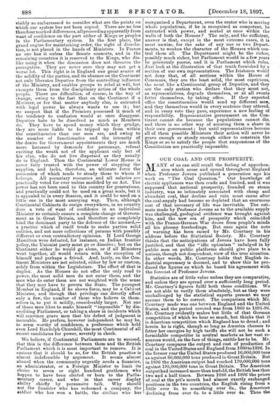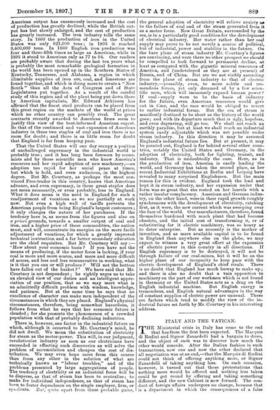OUR COAL AND OUR PROSPERITY.
ANY of us can still recall the feeling of apprehen- IV which arose and spread throughout England when Professor Jevons published a generation ago his work on "The Coal Question." Our knowledge of electric appliances was then crude and limited, and it was supposed that national prosperity, founded on steam industry, was so intimately associated with cheap and abundant coal, that decline and ruin must ensue after the coal-supply had become so depleted that an enormous cost of that necessary of life was inevitable. The esti- mate made by Professor Jevons as to the available supply was challenged, geological evidence was brought against him, and the new era of prosperity which coincided with the Franco-German War drove from people's minds all his gloomy forebodings. But once again the note of warning has been raised by Mr. Courtney in his address before the Statistical Society. Mr. Courtney thinks that the anticipations of Jevons have been fully justified, and that the "idle optimism" indulged in by public men on public platforms should give place to a serious, though not despondent, view of the true situation. In other words, Mr. Courtney holds that English in- dustrial supremacy is doomed, and to show this he pro- duced the figures on which he based his agreement with the forecast of Professor Jevons.
Statistics are of little value unless they are comparative, and unless they are spread over a sufficiently long period. Mr. Courtney's figures fulfil both these conditions. We are not able to verify them absolutely, but as they were unchallenged by the statistical experts present we may assume them to be correct. The comparison which Mr. Courtney made was one between England and the United States, and the period covered was from 1860 to 1895-96. Mr. Courtney evidently makes but little of that German competition of which we hear so much, but thinks that it is American competition which England has to dread ; and herein he is right, though so long as America chooses to fetter her energies by high tariffs she will not be such a formidable competitor in neutral markets as her vast re- sources would, on the face of things, entitle her to be. Mr. Courtney compares the output and cost of production of coal in the United States and England from 1860 to1896. In the former year the United States produced 16,000,000 tons as against 86,000,000 tons produced in Great Britain. But in 1896 the American output had reached 170,000,000 tons against 195,000,000 tons in Great Britain. The American outputhad increased more than tenfold, the British less than two and a half times. Between 1886 and 1896 the prices of coal at the pit's mouth had almost exactly exchanged positions in the two countries, the English rising from a little over 4s. to something over 6s., the American declining from over 6s. to a little over 4s. Thus the American output has enormously increased and the cost of production has greatly declined, while the British out- put has but slowly enlarged, and the cost of production has greatly increased. The iron industry tells the same story. In 1860 the production of iron in the United States was only 821,000 tons ; in 1895 it reached 9,400,000 tons. In 1860 English iron production was four and three-fifth times as large as American, while in 1895 it stood to American only as 77 to 94. Our readers are probably aware that during the last ten years what is probably the most remarkable geological formation in the world has been opened up in the Southern States of Kentucky, Tennessee, and Alabama, a region in which illimitable supplies of iron ore, coal, and limestone are found together, and which is doing more to create a "New South" than all the Acts of Congress and of State Legislatures put together. As a result of the careful study of this region and of the plant being put down there by American capitalists, Mr. Edward Atkinson has affirmed that the finest steel products can be placed from this great region on the markets of the world at prices which no other country can possibly rival. The great contracts recently awarded to American firms seem to justify this view of the best-informed American expert. So that of the continued and vast expansion of American industry in these two staples of coal and iron there is no room for doubt ; and there is as little room for doubt that England is far from keeping pace.
That the United States will one day occupy a position of unchallenged supremacy in the industrial world is probably true ; and it has long been foreseen by econo- mists and by those scientific men who know America's resources and her rapid adoption of new machinery,—an adoption too rapid for her social peace at times, but which is bold, and even audacious, in the highest degree. But Mr. Courtney, as perhaps the most con- vinced Free-trader in this country, knows that American advance, and even supremacy, in these great staples does not mean necessarily, or even probably, loss to England. What it does mean is the need in England for such a readjustment of vocations as we see partially at work now. Not even a high wall of tariffs prevents the American people from being England's largest customers ; it only changes the nature of her purchases. If the tendency here is, as seems from the figures and also on a priori grounds, towards a smaller output of coal and iron, and a higher price of these commodities, the nation must, and will, concentrate its energies on the more facile adjustment of vocations, for which a greatly improved technical instruction and a far better secondary education are the chief requisites. But Mr. Courtney will say :— ' How about your economic basis ? If you have not the means of producing, if the motor force is lacking, if your coal is more and more scarce, and more and more difficult of access, and less and less remunerative in working, what is it that you can or will produce ? Will not the bottom have fallen out of the basket ? ' We have said that Mr. Courtney is not despondent ; he rightly urges us to take an elevated view of our duties and an intelligent appre- ciation of our position, that so we may meet what is an admittedly difficult problem with wisdom, knowledge, and patience. But at the same time he says that no excellence of character can make men independent of the circumstances in which they are placed. England's physical circumstances, therefore, being somewhat hazardous, it follows front what he says that her economic future is clouded ; for she presents the phenomenon of a crowded population with that of probably declining industries.
There is, however, one factor in the industrial future on which, although it occurred to Mr. Courtney's mind, he did not dwell. We mean the substitution of electricity for steam as the motor-power. This will, in our judgment, revolutionise industry as soon as our electricians have succeeded in effecting such discoveries as will solve the problem of accumulation and cheapen the cost of dis- tribution. We may even hope more from this source than from any other in the solution of what are technically known as "labour troubles," and of the problems presented by large aggregations of people. The tendency of electricity as an industrial force will be to disperse, as that of steam has been to centralise ; to make for individual independence, as that of steam has been to foster dependence on the single employer, firm, or s)hdicate. But, qeite apart from these probable gains, the general adoption of electricity will relieve anxiety an to the failure of coal and of the steam generated from it as a motor force. Now Great Britain, surrounded by the sea, is in a particularly good condition for the development of electrical industry. Her water rather than her coal supply may prove to be not merely a source of political, but of industrial, power and stability in the future. On the bare plane of steam industry Mr. Courtney's figures are convincing, and were there no other prospect we should be compelled to look forward to permanent decline, at least as compared with the gigantic mineral resources of America, and (undeveloped as they are at present) of Russia, and of China. But are we not visibly ascending from the plane of steam industry to that of electric industry,—posssibly, even, to more subtle and tre- mendous forces, yet only dreamed of by a few scien- tific men, which will immensely expand human power If coal - supply were to be the basis of industry for the future, even American resources would give out in time, and the race would be obliged to revert to earlier industrial forms. But the era of steam is manifestly destined to be short as the history of the world goes ; and with its departure much that is ugly, hopeless, and even depraving, will go too. We shall not reach an earthly paradise, but at least we shall reach an industrial system easily adjustable which was not possible under steam industry. In this direction it may be assumed England's industrial future lies. But at present, it may be pointed out, England is far behind several other coun- tries, notably the United States and Germany, in the adoption of electricity, both for lighting, transit, and industry. That is undoubtedly the case. Here, as in the production of iron, America is easily leading the world, and Germany has taken the second place, as her recent Industrial Exhibitions at Berlin and Leipzig have revealed to many surprised Englishmen. But the main reason for this is evident. England took the lead and kept it in steam industry, and her expansion under that form was so great that she rested on her laurels with a rather insular complacency. American and German indus- try, on the other hand, were in their rapid growth roughly synchronous with the development of electricity, catching first, as it were, the new current which was sweeping over the face of the world. Our manufacturers, therefore, found themselves burdened with much plant that had become obsolete, and the initial cost of transforming it, or of substituting for it electric machinery, was so heavy as to deter enterprise. But as necessity is the mother of invention, and as more available capital is to be found in England than anywhere else on the globe, we may expect to witness a very great effort at the expansion of electric power in this country in all directions. If English supremacy is to be destroyed, it will not be through failure of our coal-mines, but it will be on the higher plane of our incapacity to keep pace with the electric development of England's chief rivals. There is no doubt that England has much leeway to make up; and there is also no doubt that a vain opposition to machinery on the part of our workmen which is not found in Germany or the United States acts as a. drag on the English industrial machine. But English energy is tremendous, and English natural advantages in the way of constant supplies of electric power are unusual. These are factors which tend to modify the view of the in- dustrial future set forth by Mr. Courtney in his interesting address.







































 Previous page
Previous page